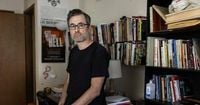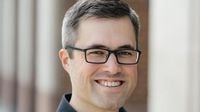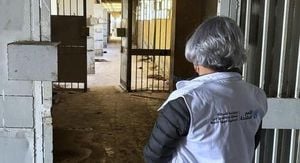Mark Bray, a history professor at Rutgers University, has announced his relocation to Spain for the academic year after receiving multiple death threats linked to his outspoken antifascist views. Bray, who has taught at the New Jersey institution since 2019, informed his students on October 8, 2025, that he and his family would be moving abroad, citing escalating threats and negative media attention that made them feel unsafe in their home.
According to The Washington Post and Newsweek, Bray’s decision came after a wave of hostility intensified in late September. The spark: President Donald Trump’s September 22 executive order designating Antifa as a domestic terrorist organization. This move, which followed the killing of conservative activist Charlie Kirk by a suspect allegedly motivated by leftist ideology (though not directly connected to Antifa), thrust Bray—already a public commentator on antifascism—into the national spotlight.
Bray, author of Antifa: The Anti-Fascist Handbook, has long been a controversial figure. His book, published in 2017, argues that "militant anti-fascism is a reasonable, historically informed response to the fascist threat that persisted after 1945 and that has become especially menacing in recent years." The handbook details a range of tactics used by militant antifascists, from singing over fascist speeches to physically disrupting the sale of fascist newspapers. Bray has openly stated that, in certain circumstances, violence from left-wing activists in response to perceived fascist threats is justified—a stance that drew sharp criticism after the deadly 2017 Charlottesville rally, where Bray, then a Dartmouth professor, was condemned by the university president for "supporting violent protest." Still, over a hundred of his colleagues rallied in his defense at the time.
The recent threats against Bray have been chillingly direct. As reported by Newsweek, one email read, "I'm gonna burn your house down and kill you as you come running out." Another declared, "You had better run, b****," while a third ominously warned, "WE THE PEOPLE are back and we do not approve of your ideas and teachings. You prey on the weak, turning their brains to mush. Your organization will soon be mush." These threats, Bray says, began to intensify after his public comments challenging the Trump administration’s characterization of Antifa and after the executive order was signed.
Bray has consistently argued that Antifa is not a single organization but rather "a kind of coalition politics of all kinds of radicals, from different kinds of socialists to communists, anarchists and more independent radicals." In his words, "There are Antifa groups, but Antifa itself is not a group." Despite his support for anti-fascist movements, Bray denies being a member of any Antifa group and insists he does not support indiscriminate violence.
The online backlash reached fever pitch when Turning Point USA (TPUSA), a conservative student organization founded by Charlie Kirk, launched a petition titled "Remove Antifa Financier & Professor, Mark Bray, from Rutgers University." The petition accused Bray of supporting radical movements and alleged that proceeds from his book benefit the International Anti-Fascist Defense Fund, which it claims has aided individuals accused of politically motivated violence. The petition further accused Bray of wishing violence on students and being an active member of Antifa—allegations he denies.
In response to the threats and mounting pressure, Bray sent an email to his students titled "Update on the Semester," explaining, "Since my family and I do not feel safe in our home at the moment, we are moving for the year to Europe." He added, "Truly I am so bummed about not being able to spend time with you all in the classroom. I really enjoyed our conversations." Bray also notified students that all classes would move online, with no more in-person sessions for the semester. The Thursday quiz was canceled, and future classes will be delivered asynchronously via recorded lectures.
Bray’s move has sparked debate on campus and beyond. Ava Kwan, TPUSA Rutgers outreach coordinator, told Fox News, "This call to violent leftist action does not justify anyone doxxing Bray or the like. We do things by the book. I want to see Rutgers address this issue publicly and end their professional relationship with Professor Bray. If Bray actually moves to Europe, it will be detrimental to our university’s reputation for him to siphon money from New Jersey taxpayers while vacationing in foreign localities friendlier to Antifa."
Meanwhile, Rutgers University has issued a statement underscoring its commitment to free speech and academic freedom: "Rutgers University is committed to providing a secure environment—to learn, teach, work, and research, where all members of our community can share their opinions without fear of intimidation or harassment. Rutgers is committed to upholding the rights of students and faculty to free speech and academic freedom as fundamental to our community. The university does not comment on specific personnel or student conduct matters." The administration also acknowledged it is aware of Bray’s plans to move to Spain for the remainder of the year and the petition calling for his dismissal, stating it is "gathering more information about this evolving situation."
In a BlueSky post dated October 4, Bray reflected on the broader implications of the current climate: "It’s true that sometimes the law holds back Trump and affords us some semblance of safety. But the more we lean into the law as our shield, the more powerful it will become as a sword when Trump changes it in his favor and wields it against us. Only mass antifascism, legal or not, can save us."
Bray’s academic credentials are not in question. At Rutgers, he has taught courses on terrorism, human rights, modern Germany, and communism. Before joining Rutgers, he was a professor at Dartmouth, where his commentary after Charlottesville first brought him national attention. Despite the turmoil, Bray remains hopeful about returning to the United States. As he told The Washington Post, "I’m hopeful about returning, and I’m hopeful—and I say this as a history professor—that someday we will look back on this as a cautionary tale about authoritarianism." For now, he plans to continue teaching remotely, prerecording lectures for his students while abroad.
The case of Mark Bray has become a flashpoint in the debate over academic freedom, campus safety, and the boundaries of political expression in a polarized America. As universities grapple with the fallout from national politics and the rise of online harassment, the story of a professor forced into exile by threats serves as a stark reminder of the risks faced by those who take public stances on contentious issues.
With the academic year underway and classes now virtual, students and faculty at Rutgers—and observers nationwide—will be watching closely to see how the university and the broader academic community respond to this unsettling episode.





